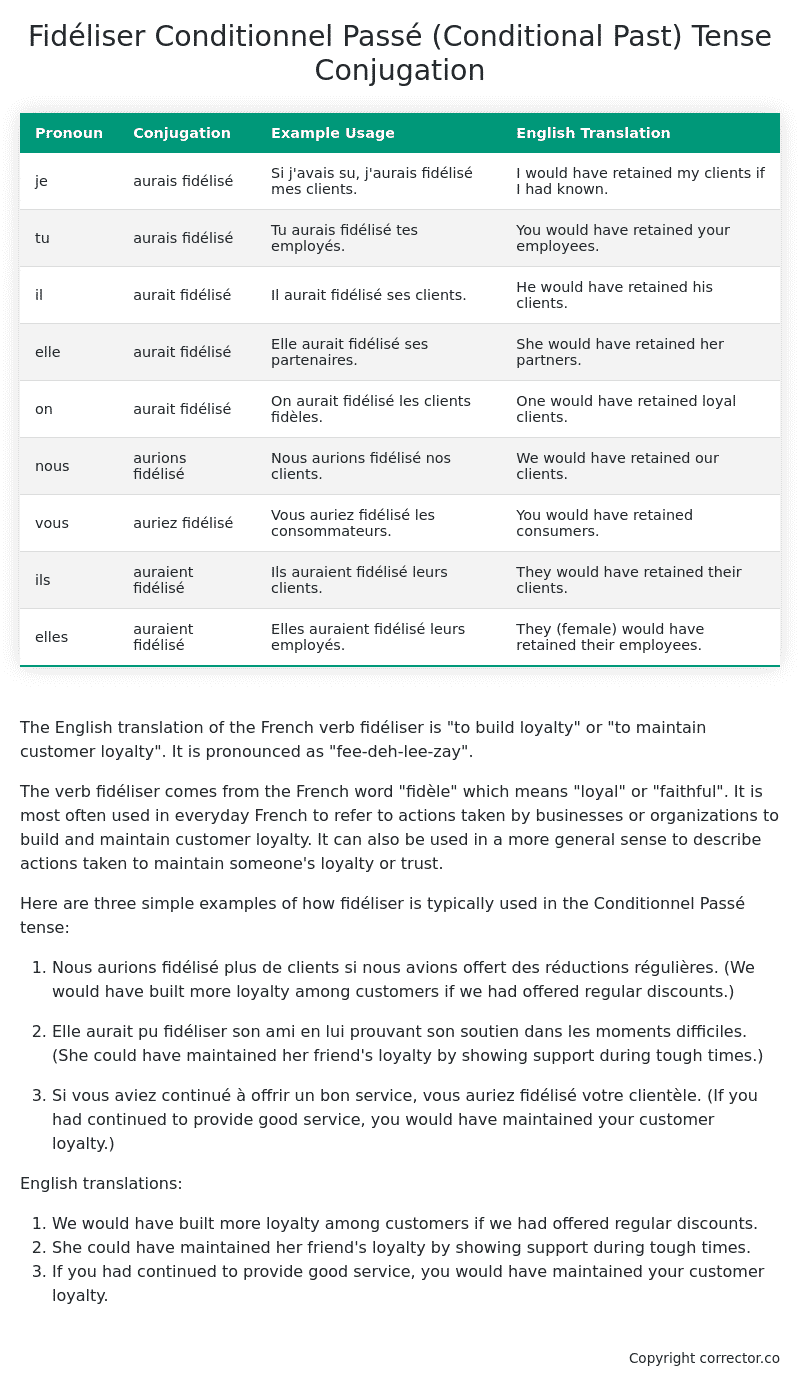Conditionnel Passé (Conditional Past) Tense Conjugation of the French Verb fidéliser
Introduction to the verb fidéliser
The English translation of the French verb fidéliser is “to build loyalty” or “to maintain customer loyalty”. It is pronounced as “fee-deh-lee-zay”.
The verb fidéliser comes from the French word “fidèle” which means “loyal” or “faithful”. It is most often used in everyday French to refer to actions taken by businesses or organizations to build and maintain customer loyalty. It can also be used in a more general sense to describe actions taken to maintain someone’s loyalty or trust.
Here are three simple examples of how fidéliser is typically used in the Conditionnel Passé tense:
-
Nous aurions fidélisé plus de clients si nous avions offert des réductions régulières. (We would have built more loyalty among customers if we had offered regular discounts.)
-
Elle aurait pu fidéliser son ami en lui prouvant son soutien dans les moments difficiles. (She could have maintained her friend’s loyalty by showing support during tough times.)
-
Si vous aviez continué à offrir un bon service, vous auriez fidélisé votre clientèle. (If you had continued to provide good service, you would have maintained your customer loyalty.)
English translations:
- We would have built more loyalty among customers if we had offered regular discounts.
- She could have maintained her friend’s loyalty by showing support during tough times.
- If you had continued to provide good service, you would have maintained your customer loyalty.
Table of the Conditionnel Passé (Conditional Past) Tense Conjugation of fidéliser
| Pronoun | Conjugation | Example Usage | English Translation |
|---|---|---|---|
| je | aurais fidélisé | Si j’avais su, j’aurais fidélisé mes clients. | I would have retained my clients if I had known. |
| tu | aurais fidélisé | Tu aurais fidélisé tes employés. | You would have retained your employees. |
| il | aurait fidélisé | Il aurait fidélisé ses clients. | He would have retained his clients. |
| elle | aurait fidélisé | Elle aurait fidélisé ses partenaires. | She would have retained her partners. |
| on | aurait fidélisé | On aurait fidélisé les clients fidèles. | One would have retained loyal clients. |
| nous | aurions fidélisé | Nous aurions fidélisé nos clients. | We would have retained our clients. |
| vous | auriez fidélisé | Vous auriez fidélisé les consommateurs. | You would have retained consumers. |
| ils | auraient fidélisé | Ils auraient fidélisé leurs clients. | They would have retained their clients. |
| elles | auraient fidélisé | Elles auraient fidélisé leurs employés. | They (female) would have retained their employees. |
Other Conjugations for Fidéliser.
Le Present (Present Tense) Conjugation of the French Verb fidéliser
Imparfait (Imperfect) Tense Conjugation of the French Verb fidéliser
Passé Simple (Simple Past) Tense Conjugation of the French Verb fidéliser
Passé Composé (Present Perfect) Tense Conjugation of the French Verb fidéliser
Futur Simple (Simple Future) Tense Conjugation of the French Verb fidéliser
Futur Proche (Near Future) Tense Conjugation of the French Verb fidéliser
Plus-que-parfait (Pluperfect) Tense Conjugation of the French Verb fidéliser
Passé Antérieur (Past Anterior) Tense Conjugation of the French Verb fidéliser
Futur Antérieur (Future Anterior) Tense Conjugation of the French Verb fidéliser
Subjonctif Présent (Subjunctive Present) Tense Conjugation of the French Verb fidéliser
Subjonctif Passé (Subjunctive Past) Tense Conjugation of the French Verb fidéliser
Subjonctif Imparfait (Subjunctive Imperfect) Tense Conjugation of the French Verb fidéliser
Subjonctif Plus-que-parfait (Subjunctive Pluperfect) Tense Conjugation of the French Verb fidéliser
Conditionnel Présent (Conditional Present) Tense Conjugation of the French Verb fidéliser
Conditionnel Passé (Conditional Past) Tense Conjugation of the French Verb fidéliser (this article)
L’impératif Présent (Imperative Present) Tense Conjugation of the French Verb fidéliser
L’infinitif Présent (Infinitive Present) Tense Conjugation of the French Verb fidéliser
Struggling with French verbs or the language in general? Why not use our free French Grammar Checker – no registration required!
Get a FREE Download Study Sheet of this Conjugation 🔥
Simply right click the image below, click “save image” and get your free reference for the fidéliser Conditionnel Passé tense conjugation!

Fidéliser – About the French Conditionnel Passé (Conditional Past) Tense
Formation
Common Everyday Usage Patterns
Expressing Unreal Past Scenarios
Polite Requests or Suggestions
Expressing Doubt or Uncertainty
Interactions with Other Tenses
Conditional Present
Indicative Past Tenses
Conditional Future
Summary
Want More?
I hope you enjoyed this article on the verb fidéliser. Still in a learning mood? Check out another TOTALLY random French verb conjugation!


